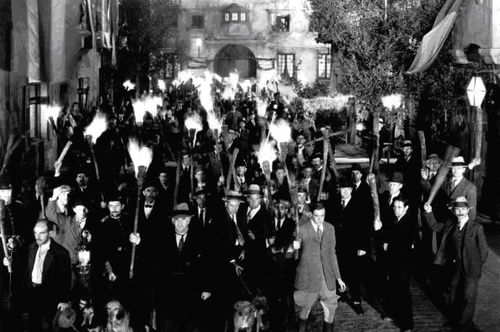At 3:32 p.m., Mountain Standard Time, on December 5, 1933, Utah ratified  the 21st Amendment to the Constitution, the 36th state to do so (close on the heels of Pennsylvania and Ohio). It was the magic number required to repeal the 18th Amendment. Booze was back. The so-called noble experiment, 13 years worth of national prohibition of alcohol in America, had ended, having been pretty much a dismal failure.
the 21st Amendment to the Constitution, the 36th state to do so (close on the heels of Pennsylvania and Ohio). It was the magic number required to repeal the 18th Amendment. Booze was back. The so-called noble experiment, 13 years worth of national prohibition of alcohol in America, had ended, having been pretty much a dismal failure.
Prohibition was supposed to reduce crime and corruption, solve social problems, reduce the tax burden created by prisons and poorhouses, and improve health, hygiene and good manners throughout the country. Instead it ushered in the likes of Al Capone and made a lot of ordinarily law-abiding citizens petty criminals. We got bootlegging and speakeasies, moonshine and bathtub gin.
By the early 1930s the electorate had pretty much demonstrated a profound distaste for abstinence. When Franklin Roosevelt ran for President in 1932 pledging repeal, it was bye-bye tee-totaling Herbert Hoover. The new President celebrated with his own dirty martini.
Alas, it wasn’t freedom from sobriety for everyone. Several states continued Prohibition with state temperance laws. Mississippi didn’t join Tipplers Unanimous until 1966.
A few observations overheard on the occasion:
“I think the warning labels on alcoholic beverages are too bland. They should be more vivid. Here is one I would suggest: “Alcohol will turn you into the same asshole your father was.” ― George Carlin
“We were not a hugging people. In terms of emotional comfort it was our belief that no amount of physical contact could match the healing powers of a well made cocktail.”― David Sedaris
“I like to have a martini,
Two at the very most.
After three I’m under the table,
after four I’m under my host.”
― Dorothy Parker
“When a man who is drinking neat gin starts talking about his mother he is past all argument.” ― C.S. Forester
“In wine there is wisdom, in beer there is Freedom, in water there is bacteria.” ― Benjamin Franklin
“It’s 4:58 on Friday afternoon. Do you know where your margarita is?” ― Amy Neftzger


